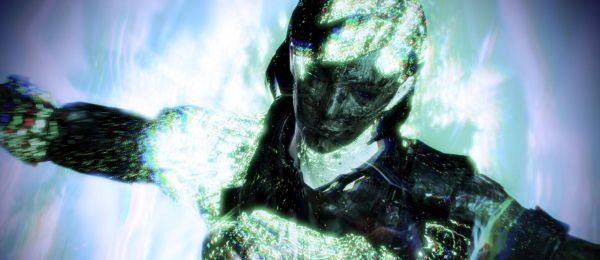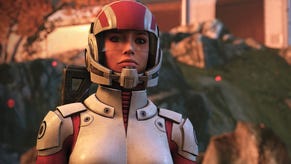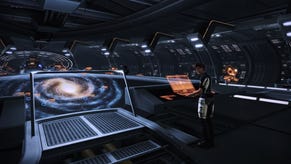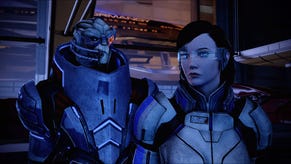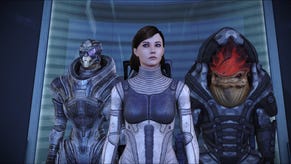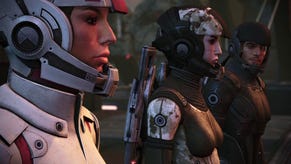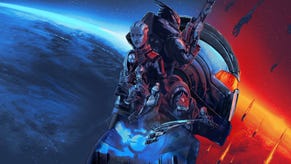What's Right With Mass Effect 3's Ending
Defending The Ending (DefEnding)
The obsession with endings is a peculiar one. Perhaps it's a result of having been indoctrinated by a lifetime of movies with "surprise twists", or stories so poorly written that they rely on their final hook. But however we've come to this place, it's one that fails to recognise the real pleasure of being told a story. Mass Effect 3 tells a story, and I'm here to defend it.
Clearly this post contains spoilers. All of them.
Another trap gamers have fallen into is the sheer disgust with which the notion of "being told a story" is met. The distinction with gaming, you see, is you get to make choices, and those choices have consequences, and thus the game is unique to us. That notion makes sense in a game like Minecraft, but applying it to narrative, pre-scripted projects like the Mass Effect series is just naive. Even in a game like Dragon Age, where our choices lead to what feels like a unique conclusion just for us, we still fought the same big dragon, still followed the exact same path, and merely received cosmetic differences, none unique but shared by tens/hundreds of thousands of others. And that's great! Because BioWare had a story to tell, and they were going to tell it.
I feel like so many of people's complaints about Mass Effect 3's apparent lack of consequence would have been addressed by something as tacky as Dragon Age's flash-card descriptions of what had happened to the characters in your party. Like an Eighties movie freeze-framing at the end and telling us who went on to discover a cure for cancer, and who finally settled down and had three kids, it certainly gives an immediately satisfying sense of closure, and perhaps would have dealt with a lot of the grumbling. But I'd argue it robs the player of so much potential for those characters. "Grunt went on to form a band, Grunt And The Tube Babies, who had 91 top ten hits in the Galactic Billboard, thanks to Shepard's love and support." I loved and supported Grunt! That means my choices were meaningful!
But here's the thing: My choices did have consequences. So many, on so many of the characters, in so many ways. It's just, those consequences occurred on my long path toward the ending. And, well, that's bloody brilliant, isn't it?
Many are upset by the final moments, a three-way decision that is not impacted upon by the rest of the game, as if this invalidates everything that came before it. But two things. 1) What about everything that came before it? 2) How is that decision not impacted upon by the previous three games?!
A choice I made wiped out an entire species. Unable to choose the Quarians' wrath over the Geth's capitulation, I was unaware that giving them the option to choose would mean seeing them wiped out of existence. Even less that Tali would throw herself off a cliff in understandable suicidal misery. And that choice, that decision to give the freshly sentient Geth my support, had one hell of a consequence on the galaxy. In that final battle the Geth fought alongside the Alliance forces, something that would have seemed impossible at the end of Mass Effect 1. The Quarian were all dead, every last one of them. My actions had consequences, and they were beyond huge.
I forged cooperation between the Krogan and the Turians. I've no idea if that's a pre-scripted inevitability, or the result of my choices, and crucially I don't care. As a result of what I did, however it came about, another remarkable change occurred in the galaxy. One with enormously far-reaching consequences. I saw the Salarians, albeit unwillingly, give the Krogan life. My involvement saw that real, extraordinary change occur, whether a race was broken free from a curse that would have seen them wiped out. I made the decision that even though there may be terrible consequences, this species deserved the right to breed.
Those are some of the massive consequences my actions had. Then there were the dozens and dozens of minor, more personal ones. The relationships I forged, the people I loved, the comments I made. They all influenced not only the on-going relationships with other characters, but so crucially, the moments themselves. By choosing to be supportive rather than strict, the instance of that conversation changed, the tone was a consequence of my actions, and the reactions of others were changed in context. Because I choose to shoot down the advances of Traynor, I didn't have a sexual relationship with her. Because I opted to be supportive of Joker and EDI's relationship, they found love. Because I said a kind thing, rather than a cruel thing to Liara, she felt good in a moment, rather than bad.
Characters I almost ignored, like James Vega and Ashley Williams, still were impacted by my presence in their lives, and mine was impacted by them. I encouraged Vega to join the N7. I teased Ashley when she was hungover, rather than admonished. And while all those things may have made no difference to whether the Reapers were defeated, of course they had consequences on my game. Consequences in those instances, affecting my story and toning my experience.
But what about those final three choices. Yes, of course, they were a strange way to finish. But to suggest that they were out of the blue is absolutely untrue. And to write off the "ghost boy" is to make the same sad mistake that so many do with the beach scene in Contact, when we see Ellie's father. An alien/god choosing to appear in a meaningful form obviously does not mean it is that thing. The Catalyst appearing as that small boy could hardly have been more established by the game, via three separate dream sequences that demonstrated quite what a devastating effect his death had had on Shepard. He came to represent all the terrible deaths on Earth, and indeed throughout the galaxy, that Shepard was unable to stop. He haunted her dreams because he was the catalyst for her fear and drive. (Although you could argue that he himself did get used up in the reaction.) For the Catalyst to choose his form to appear to Shepard made sense - it was designed to create an emotional reaction in her, to represent the potential for gain after so much loss.
And then the choices themselves. Of course anyone is welcome to dislike the options, or dislike that they're there at all, but to suggest they're not relevant to the games isn't fair. There was certainly a failure to properly define that it all comes down to the creation of Synthetics, and their eventual destruction of Organics, and I am confused by how an apparently ancient Synthetic race is the one arguing this. But as Shepard herself appeals, this is the result of an ancient race having lost its way. They firmly believe that what they do is for the good of the galaxy, and that they're preserving these races in Reaper form, but they do not see how evil their actions have become. They're wrong. But they're wrong from a position of enormous power, and it's a power that not only dominates the worlds of Mass Effect, but also the player. Those three choices - those are what you get, from a wayward god-like species that's in control. Don't like the options? Hell, maybe that's the point.
My choice - to choose synthesis - was utterly and completely influenced by the three games I'd played. I had seen the potential, the evolution of the Geth into a race capable of independent choice, the relationship between an AI and a human, and the possibility of a massive uniting step forward from a repeating pattern that had gone on for countless aeons. It may be sci-fi hokum that it's possible, it may spring from nowhere that a big wobbly green light could turn all robots and humans into robothumans. But I was cool with Mass Effect Relays transporting me millions of lightyears around the galaxy in only the time it took for one maddeningly unskippable cutscene to play through. I'm okay with made up sci-fi nonsense in my made up sci-fi nonsense.
The consequence of having played three superb games - games in which I'd felt relationships with characters like in nothing else I've played - played out in that choice.
I commented to others as I played the game over the last week how exciting it was that decisions I'd made five years ago were having an impact on the story I was being told now. My being able to continue a relationship with Garrus was a joy, and made a huge difference to how I experienced the game. The races I'd saved being present at the end, fighting alongside me, was more important to me than whether it actually made any difference to what happened.
I've played each game in the series once. At around 30 hours a time, that's plenty for me. So I've not dissected them like a detached scientist, analysing which parts would have been the same no matter what I did. I find it so remarkable that so much of people's fury with the game comes not in what they experienced, but what they learned about their experience after. For me, I filled up that bar with green, I made the choices that mattered to me, and in those final scenes I saw thousands and thousands of ships turn up to fight for Earth. That was my experience as I played, and I adored it. It was dark, brutal, often devastating. It was funny, silly and often heart-warming. In the end, it was the story of a small group of friends, and their particular experience of the end of the worlds. A story about the hope to be found in utter devastation.
The ending may not have matched up to your wishes. Despite my vociferous support for it, I can empathise with a number the arguments. But it was not a denial of choice or consequence - it was a series of three games about choice and consequence, the two happening constantly throughout. And good grief, thank goodness it didn't fade to black and leave everything ambiguous, with just enough room for 900 more sequels.








